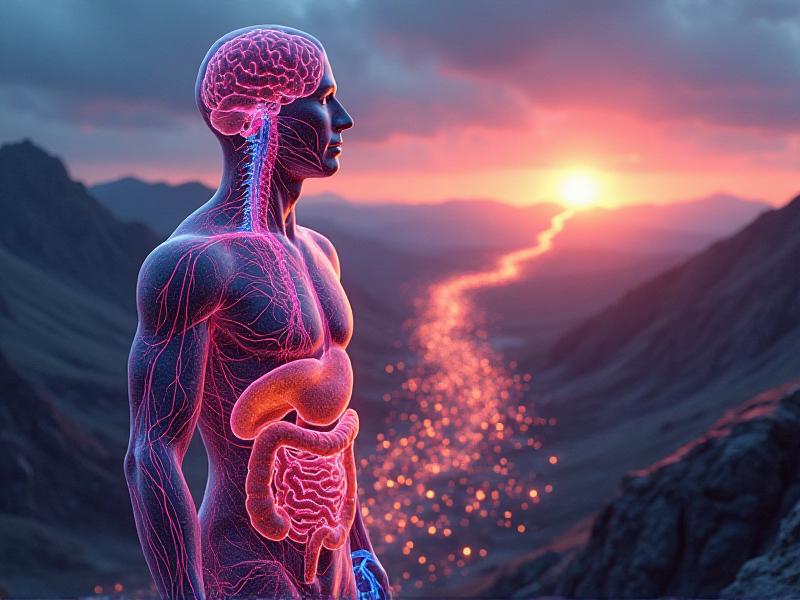Empowering Your Mind Through Microbial Wellness
The Gut-Brain Connection: How Microbes Influence Mental Health
For centuries, the gut was considered a mere digestive organ, but recent scientific discoveries have revealed its profound connection to the brain. This relationship, often referred to as the gut-brain axis, is a bidirectional communication system where the gut microbiota plays a pivotal role. The trillions of microbes residing in your gut produce neurotransmitters like serotonin and dopamine, which are crucial for regulating mood, anxiety, and overall mental well-being. In fact, approximately 90% of serotonin, often dubbed the "feel-good" hormone, is produced in the gut.
Research has shown that an imbalance in gut microbiota, known as dysbiosis, can lead to mental health issues such as depression, anxiety, and even neurodegenerative diseases. For instance, studies have found that individuals with depression often have less diverse gut microbiomes compared to their healthy counterparts. This highlights the importance of maintaining a balanced gut ecosystem for optimal mental health.
So, how can you nurture this connection? Incorporating probiotic-rich foods like yogurt, kefir, and fermented vegetables into your diet can help replenish beneficial bacteria. Additionally, prebiotics—found in foods like garlic, onions, and bananas—serve as fuel for these microbes, promoting their growth and activity. By prioritizing gut health, you’re not just supporting digestion; you’re empowering your mind.

The Role of Probiotics and Prebiotics in Mental Wellness
Probiotics and prebiotics are often hailed as the dynamic duo of gut health, but their benefits extend far beyond digestion. Probiotics are live beneficial bacteria that help maintain a healthy gut microbiome, while prebiotics are non-digestible fibers that feed these bacteria. Together, they create a symbiotic relationship that supports both physical and mental health.
Emerging research suggests that certain strains of probiotics, such as Lactobacillus and Bifidobacterium, can reduce symptoms of anxiety and depression. These strains influence the production of neurotransmitters and modulate the body’s stress response. For example, a study published in the journal Brain, Behavior, and Immunity found that participants who consumed a probiotic-rich yogurt experienced reduced levels of cortisol, the stress hormone.
Prebiotics, on the other hand, enhance the effectiveness of probiotics by providing them with the nutrients they need to thrive. Foods rich in prebiotics, such as asparagus, oats, and apples, can help create an environment where beneficial bacteria flourish. By incorporating both probiotics and prebiotics into your diet, you’re not just feeding your gut; you’re nourishing your mind.

How Stress Impacts Your Gut Microbiome
Stress is an inevitable part of life, but its effects on your gut microbiome can be profound. When you’re stressed, your body releases hormones like cortisol and adrenaline, which can disrupt the delicate balance of your gut bacteria. This disruption can lead to a cascade of negative effects, including inflammation, reduced nutrient absorption, and even changes in brain function.
Chronic stress, in particular, can wreak havoc on your gut microbiome. Studies have shown that prolonged stress can decrease the diversity of gut bacteria, making you more susceptible to infections and mental health issues. For example, research has linked high-stress levels to conditions like irritable bowel syndrome (IBS), which is often accompanied by anxiety and depression.
Fortunately, there are ways to mitigate the impact of stress on your gut. Mindfulness practices like meditation and deep breathing can help regulate your stress response, creating a more favorable environment for your gut bacteria. Additionally, regular exercise has been shown to improve gut microbiome diversity, further supporting mental and physical health. By managing stress effectively, you’re not just protecting your gut; you’re safeguarding your mind.

The Science Behind Fermented Foods and Mental Clarity
Fermented foods have been a staple in traditional diets for centuries, and modern science is now uncovering their potential to enhance mental clarity. Fermentation is a natural process where microorganisms like bacteria and yeast break down sugars and starches, producing beneficial compounds like lactic acid and short-chain fatty acids. These compounds not only improve gut health but also have a direct impact on brain function.
For instance, fermented foods like kimchi, sauerkraut, and miso are rich in probiotics that support a healthy gut microbiome. A healthy gut, in turn, produces neurotransmitters and other signaling molecules that influence cognitive function. Studies have shown that regular consumption of fermented foods can improve memory, focus, and even mood.
Moreover, fermented foods are often rich in antioxidants, which protect the brain from oxidative stress—a key factor in cognitive decline. By incorporating fermented foods into your diet, you’re not just boosting your gut health; you’re sharpening your mind. Whether it’s a tangy kombucha or a savory tempeh dish, these foods offer a delicious way to support mental clarity.

Practical Tips for Cultivating a Healthy Gut Microbiome
Maintaining a healthy gut microbiome doesn’t have to be complicated. Small, consistent changes to your diet and lifestyle can make a significant difference. Start by diversifying your diet to include a wide range of fruits, vegetables, whole grains, and legumes. These foods provide the fiber and nutrients your gut bacteria need to thrive.
In addition to diet, consider incorporating stress-reducing practices into your daily routine. Activities like yoga, meditation, and even spending time in nature can help regulate your stress response, creating a more favorable environment for your gut bacteria. Regular exercise is another key factor; it not only improves gut microbiome diversity but also enhances overall mental and physical health.
Lastly, be mindful of medications that can disrupt your gut microbiome, such as antibiotics. While antibiotics are sometimes necessary, they can wipe out both harmful and beneficial bacteria. If you need to take antibiotics, consider supplementing with probiotics to help restore balance. By taking these practical steps, you’re not just nurturing your gut; you’re empowering your mind.

The Future of Microbial Wellness: Emerging Research and Innovations
The field of microbial wellness is rapidly evolving, with new research shedding light on the intricate relationship between gut health and mental well-being. One promising area of study is the use of psychobiotics—probiotics specifically designed to improve mental health. These specialized strains of bacteria have shown potential in reducing symptoms of anxiety, depression, and even PTSD.
Another exciting development is the use of fecal microbiota transplantation (FMT) to treat mental health disorders. While FMT is currently used primarily for gastrointestinal conditions, early studies suggest it could also be effective for conditions like depression and autism. This innovative approach involves transplanting healthy gut bacteria from a donor to a recipient, effectively "resetting" the gut microbiome.
As research continues to advance, the potential applications of microbial wellness are virtually limitless. From personalized probiotics to microbiome-based therapies, the future holds immense promise for harnessing the power of microbes to enhance mental health. By staying informed and embracing these innovations, you’re not just keeping up with the latest trends; you’re investing in your long-term well-being.









